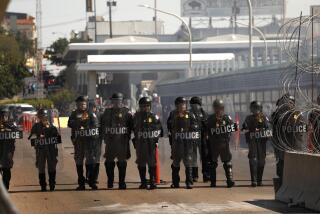A Tool for the Sandinistas
The State Department has bluntly warned the government of Nicaragua that it will be held responsible for terrorist acts against American citizens in Central America. The Reagan Administrationâs concern about Nicaraguaâs activities in the region is valid. Its response is not.
U.S. officials said that the warning was issued because intelligence reports indicate that terrorist actions are being planned against U.S. military personnel in Honduras by groups with links to Nicaraguaâs Sandinista government. It says that such attacks will be viewed as the âdirect responsibilityâ of Nicaragua, and that the United States will âreact accordingly.â
The informal ties between the Sandinistas and rebel groups in El Salvador and other Latin American countries, and with terrorist groups like the Palestine Liberation Organization, have been known for some time. And there have been reports in recent months that citizens of Costa Rica, Honduras and other nations are in Nicaragua planning rebellions in their homelands and being trained by the Sandinistas. Reminding the Nicaraguan government that these activities are being watched closely can have a deterrent effect.
But why issue the warning note in a way that was bound to become public? And why have the U.S. ambassador in Managua deliver it on the anniversary of the Sandinistasâ revolutionary victory? Again it appears that President Reagan and his aides are letting dramatic gestures and fierce words substitute for constructive policy in Central America.
By so bluntly warning the Sandinistas on the eve of an important commemoration, Reagan handed them a propaganda tool. They will use the note as further evidence that yet another U.S. invasion of their country is coming. And when U.S. officials deny that an invasion is contemplated, they will not be believed--not just in Nicaragua but also in this country, where many people are convinced that Reagan is out to overthrow the Sandinistas at any cost.
The irony of this situation is that if there are more terrorist acts against Americans in Central America, something that is more likely than not, anything short of a U.S. invasion of Nicaragua will be seen as a sign of weakness. Reaganâs penchant for symbolism and rhetoric has again put him in a no-win situation.
The President must start dealing with the Sandinistas more realistically, and he must accept the fact that their revolutionary government is not going to change or be overthrown. Rather than harassing them ineffectively, the United States must reach an accommodation with the Sandinistas. Let them have their revolution, as long as they do not export it beyond Nicaraguaâs borders or allow foreign powers to use Nicaraguan territory to threaten U.S. interests in Central America and the Caribbean. The Sandinistas, for all their own fierce rhetoric, seem to realize that they can live with the United States. However distasteful Reagan finds it, he must come to the same eminently rational conclusion. Only then can both governments resume the quiet diplomacy that is the only effective way of bringing peace and stability to Central America.
More to Read
Sign up for Essential California
The most important California stories and recommendations in your inbox every morning.
You may occasionally receive promotional content from the Los Angeles Times.










